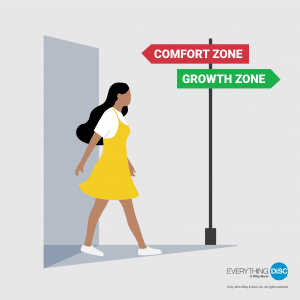Knowing one’s own DiSC® style, or that of another, can help you be aware of what situations might cause you stress and how you might respond. While this article was originally written in response to the COVID-19 restrictions, it has been updated and can apply to stresses caused by major changes such as illness, injury, military deployment, job change or loss, death of a loved one, marital separation, incarceration, or retirement.
The i style might show their stress through sadness, anger, lack of follow-through, or more disorganization than normal. You might notice the i style chomping at the bit to gather everyone they love together, return to pre-COVID-19 activities, and maybe add a few more. They might be frustrated by having to stretch more often into other styles to get everything done and keep their household in order. Other people might be putting unexpected demands on them.

What might be stressing to the i style?
The i styles might be challenged by some of the following:
- few opportunities to be social
- feeling rejected (with or without objective evidence)
- not getting the attention they crave
- lack of collaborative activities
- routines feeling old, stale, or stifling
- drop in the energy level around them
- being expected to control their impulses, especially creative or social ones
- pessimistic or distracted attitudes of others
- isolation or distance from others
- few opportunities for self-expression
- anything that challenges their core belief: I’m valuable if I can attract people
What does the i style need during times of stress?
Excitement: being part of energizing new opportunities
Being heard: knowing that their opinions and feelings about the change(s) are heard
Relationships: maintaining a connection with important people in their world
Tips for the i style
- What are you curious about? Learn new skills. Try a community ed class or two, which will also allow you to meet new people. Or set up a regular skill-sharing event or show-and-tell night with people you know, where attendees take turns teaching the others how to do something, whether it’s baking bread or using macros in Microsoft Word or speaking a few phrases of Japanese.
- Even though they have been transformed during the pandemic, reconnect, maintain, or develop your social networks. There are many new communities to discover and explore since so much that used to only happen in person now happens online and is thus available wherever you live.
- Don’t take it personally if your introverted friends and family aren’t responding to your friendly outreach with the same energy. Withdrawing might just be how they’re coping with stress, and it is very likely that they still appreciate hearing from you even if they don’t reciprocate.
- Your enthusiasm and people skills would be a much-appreciated gift to organizations in your community. Consider your local community and those you may have discovered online.
- Find creative ways to share yourself with others. Enjoy some karaoke, send some homemade cards, update your video background, or indulge in a little adult coloring.
- Swap your mental list of things you can’t do and/or people you can’t see right now for a list of what you can do and people you can see. Write this “can” list down. Once you start listing, you may find you have more ideas than you knew. This is an opportunity to build relationships in new ways.
- Read a bit about cognitive load theory to gain a better understanding of why it’s just so hard to focus right now. It’s OK if you’re having more trouble than usual finishing projects and organizing your thoughts. Remember the extraordinary circumstances you’re in and recalibrate expectations for yourself.
- That said, sometimes you do need to buckle down and get things done. Try the Pomodoro Technique: Set a timer for 25 minutes, and focus on only that task for those 25 minutes. When the timer goes off, take a five-minute break and put a checkmark on a piece of paper. Then, start the 25-minute timer again. Once you have four checkmarks, take a longer break during which you step away and do something like go for a walk outside.
- Many of us are consuming more media than we were before, but doomscrolling can really spike stress levels, especially for passionate i-style folks. Try stretching into the objective mindset and stepping back for a moment before getting swept away in the current of social media.
Tips for every style
- Get enough sleep. Try napping.
- Exercise as appropriate.
- Eat right.
- Get outside. If you can’t get outside, look at images of outdoor beauty or get a few indoor plants.
- Stay connected and social in safe ways.
- Practice self-compassion.
- Stay (or become) grateful. Studies have shown that those who practice gratitude are more optimistic and have better relationships.
- Look for opportunities to laugh. This video of babies laughing is worth viewing.
- Show your concern for others by performing random acts of kindness.
- Ask for help if you need it. Now might be the time to reach out to a friend, a life coach, a therapist, or a help line.
- Learn more about yourself with Everything DiSC Workplace or build your emotional intelligence with Everything DiSC Agile EQ.
I’d like to end this with these words from Ron Siegel, PsyD, assistant professor of psychology at Harvard Medical School:
“Positive psychology is not about denying difficult emotions. It’s about opening to what is happening here and now, and cultivating and savoring the good in your life.”

